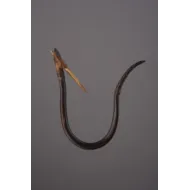Northwest Coast Nootka Indian Carved Cedar Wood Halibut Fishing Hook
A Northwest Coast Nootka Indian Carved Cedar Wood Halibut Fishing Hook
The bone barb lashed to the point with spruce root
Aged smooth silky patina
Circa 1800 – 1820
Size: 16cm high, 15.5cm wide – 6¼ ins high, 6 ins wide
The bone barb lashed to the point with spruce root
Aged smooth silky patina
Circa 1800 – 1820
Size: 16cm high, 15.5cm wide – 6¼ ins high, 6 ins wide
The lives of the Northwest coast Indians were largely dependent on the bounty of the sea and over the centuries efficient methods of harvesting these foods developed. The halibut was one of their most important sources of protein with a nutritious white flesh, which could also be dried and preserved, with the surplus dried fish used as an intertribal currency. Halibut grounds were regarded as family or clan property, and although often far from shore, these areas were located and identified by aligning land features in two directions.
Single large hooks such as this were hung from the ends of a stick and lowered to the sea bottom on lines made of kelp stem weighted with a boulder. The buoyant wooden hooks would float up to a fixed and carefully calculated distance from the bottom. Tremendous stress was placed on the hook by the power and weight of the fish, but the design of the hook applies a mechanical leverage to the fish's jaw enabling its capture. Nootkan fishermen claim that the halibut submit to the hooks and allow themselves to be hauled in with little resistance.
Single large hooks such as this were hung from the ends of a stick and lowered to the sea bottom on lines made of kelp stem weighted with a boulder. The buoyant wooden hooks would float up to a fixed and carefully calculated distance from the bottom. Tremendous stress was placed on the hook by the power and weight of the fish, but the design of the hook applies a mechanical leverage to the fish's jaw enabling its capture. Nootkan fishermen claim that the halibut submit to the hooks and allow themselves to be hauled in with little resistance.
Northwest Coast Nootka Indian Carved Cedar Wood Halibut Fishing Hook

SOLD
